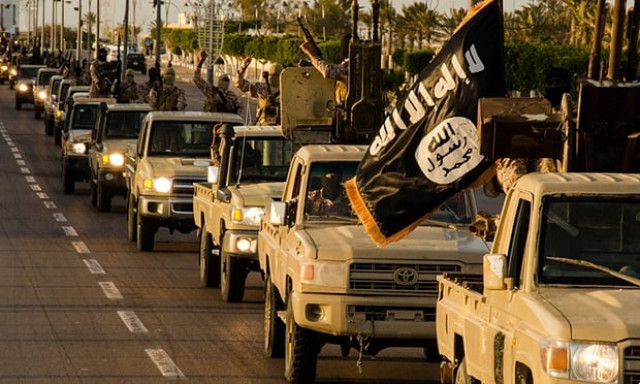Islamic State expanding foothold in Afghanistan
The Islamic State claimed twin suicide attacks in Kabul on Saturday

PHOTO: AFP
More than 80 people were killed and nearly 290 wounded when two suicide bombers struck in the midst of a rally organised by the Shia Hazara community in the capital Kabul.
The Islamic State, also known by its Arabic acronym Da’ish, claimed the credit, while the Afghan Taliban were quick to disavow the sickening carnage.
The bombings not only raised fears of sectarian violence, which has so far been relatively uncommon in Afghanistan, but also established Da’ish as a real security challenge for the country’s forces.
Earlier, Da’ish had presence only in the mountainous regions of eastern Afghan province of Nangarhar, but Saturday’s attack shows the group now has an organised foothold in the strife-torn country to rival the Taliban.
Government officials in northern Afghanistan have also confirmed the group’s presence – a fact that could raise alarm in Moscow and neighbouring Central Asian States. It is believed that the recent warming up of Iran and Russia to the Taliban was prompted by the growing threat of Da’ish. The Islamic Movement of Uzbekistan, which maintains some presence in northern Afghanistan, has already joined Da’ish.
Da’ish is believed to be more organised in Afghanistan than even the Taliban since it started activities in Haska Mina district, also called Deh Bala, in Nangarhar, near Tirah Valley of Pakistan’s Khyber Agency. Though the Taliban could not launch their radio, Da’ish’s radio Seda-i-Khilafat, or Voice of Caliphate, went on air early this year. It was decimated in a US drone strike in February, but it started broadcasting again in March in two languages Pashto and Dari and later in Uzbek language too. The radio was reportedly hit by another US drone this month.
An Afghan Taliban commander, Abdul Khaliq, alias Umar, had spearheaded Da’ish in Deh Bala district after parting ways with the movement. He managed to take over the areas which had been under the Taliban control until early 2015. “The stunning victory earned sizeable support for Da’ish which subsequently set up bases in the region,” a resident of Deh Bala told The Express Tribune by the phone.
The ranks of the group’s top cadres further swelled when five senior commanders of the Tehreek-e-Taliban Pakistan, including TTP head for Orakzai Agency Hafiz Saeed Khan and central spokesperson Shahidullah Shahid, had sworn allegiance to the self-styled caliph Abu Bakar al-Baghdadi.
Later TTP’s Bajaur Agency chapter joined Da’ish en masse. And Saeed Khan was picked to head the group’s so-called Khorasan region, which includes Pakistan and Afghanistan. Khan’s brutal activities, including blowing up of Taliban prisoners, annoyed Abdul Rahim Muslimdost – a former Guantanamo inmate who was the first Afghan to pledge allegiance to Baghdadi – who quit the group.
The presence of Da’ish in Nangarhar, a province that hosts a large US military airbase, raises the question that how ultra-extremist militants have managed to sneak into Afghanistan in huge numbers from the Pakistan side of the border, and how they could unleash a reign of terror right under the nose of highly equipped American troops.
The Afghan Taliban have long considered Da’ish a threat, and the movement’s slain chief, Mullah Akhtar Mansoor, wrote to Baghdadi in June last year, warning him against ‘interference’ in Afghanistan and that “there is room for only one flag and one leadership” in his country.
Saturday’s attack on the Hazara rally has sparked strong criticism against Afghan security forces for their inability to check the infiltration of the Da’ish suicide bombers in Kabul. Interior Ministry spokesperson Sediq Sediqqi was under fire at a Tolo TV show for claims that air strikes by Afghan forces and American drones have degraded the ability of Da’ish to carry out attacks outside their hideouts in Nangarhar.
Analysts believe that in order to counter the Da’ish threat, the Afghan government, the Taliban and all major stakeholders should shift their focus to political dialogue to work out a negotiated settlement in Afghanistan. No serious efforts have been made by either side for peace talks which led Da’ish to exploit the situation to its favour and pose a threat to all.
Published in The Express Tribune, July 25th, 2016.






1724319076-0/Untitled-design-(5)1724319076-0-208x130.webp)












COMMENTS
Comments are moderated and generally will be posted if they are on-topic and not abusive.
For more information, please see our Comments FAQ